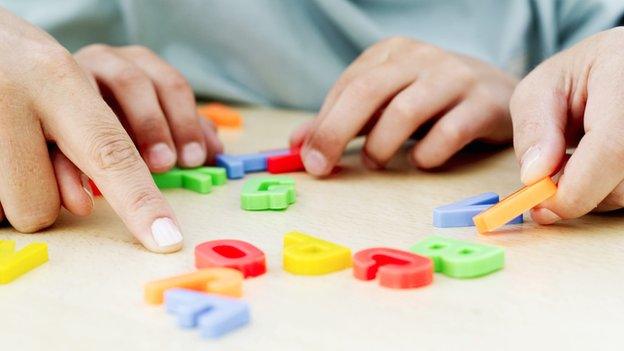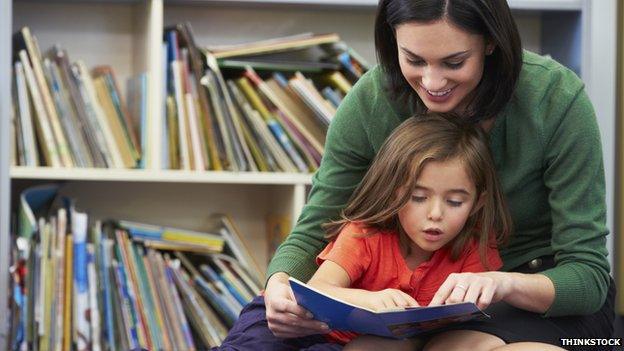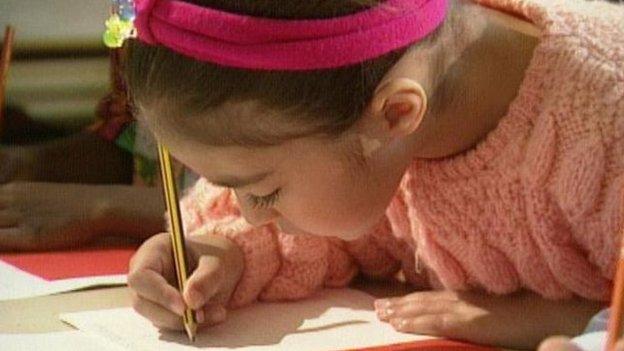Early literacy 'key' to closing education gap
- Published

Children from more deprived backgrounds are still lagging behind their wealthier classmates in Scottish schools
Improving the language skills of young children from deprived backgrounds could be the key to closing Scotland's attainment gap, according to a report.
The research by the Read On, Get On campaign, external suggested one in five children growing up in poverty is unable to read well by the time they finish primary.
It said this helped explain Scotland's "persistent education divide".
It called for all nurseries to have a member of staff with an early language or literacy qualification.
The campaign group is a coalition of charities including Save the Children and literacy agencies.
By the age of five most children should be able to speak in full sentences and use most of the everyday words that adults use, according the group.
At this stage, youngsters should also be asking lots of "why?" questions as they try to understand the world around them, and should be able to talk confidently about the past and the future.
Basics of language
But the report said that Scotland continued to experience a "stubborn gap in language skills between poorer children and their peers".
It added: "Children from the most deprived areas are twice as likely to experience difficulties in language development before they start school.
"At age three, a third of children identified as having a speech, language or communication concern are from the most deprived areas."
These struggles continue as children start primary school, affecting literacy levels at age 11 and leaving a legacy that will stay with them into adulthood, the report's authors said.
It added it was "vital that, as a country, we do more to ensure that the vast majority of children develop strong language skills by the age of five".
There has been concern about an "attainment gap" in Scotland's education system between those from the wealthiest and least well-off areas of the country.
And the recent Scottish Survey of Literacy and Numeracy found that reading standards in primary schools had fallen since 2012.
Read On, Get On wants to see more focus on developing early language skills in childcare inspections, adding that staff should also be trained to support parents help their children with the basics of language and identify those who might need extra help.
The campaign also called on the Scottish government to invest more in early-years learning to ensure that every nursery has at least one member of staff with a graduate-level qualification in early language or literacy.

Prof Sue Ellis, the campaign's chairwoman, said language skills were the biggest educational issue facing young children in Scotland.
She added: "Being behind in language will affect children's learning, their social skills and their life chances.
"Early language is the vital stepping stone to literacy and there is very clear evidence that poverty and deprivation continue to impact on children's ability to read well. Illiteracy impacts on all areas of a child's life."
The Scottish government said that improving literacy and attainment, particularly for the poorest children, was one of its key priorities.
A spokeswoman said: "Curriculum for Excellence is setting higher standards than ever before in literacy and numeracy and results from the forthcoming Growing Up in Scotland study show vocabulary in three-year-olds is getting better.
"But we will not rest until we see clear evidence that we have closed the attainment gap for every child."
'Failing to deliver'
Opposition parties said the report should act as a call for further action from the government.
Cara Hilton, Labour's spokeswoman for children and young people, pointed out that P7 children leaving school this month had spent all their school years under an SNP government.
She said: "The SNP have had eight years to get it right for every child yet in report after report, all the evidence suggests they are failing to deliver for the children who need the most support and the gap continues to grow."
Liz Smith, the Conservative spokeswoman for young people, said children were far too often arriving at school already some way behind their peers when it comes to reading and language skills.
She added: "Children who can engage well with their parents and teachers when they are reading develop much greater confidence and self-esteem, and it gives them a head start when it comes to other learning."
Liberal Democrat education spokesman Liam McArthur said the report underlined the need for the Scottish government to expand free childcare for two-year-old children.
He said: "If the Scottish government is serious about closing the attainment gap, it must at the very least match provision with that currently delivered in England."
- Published29 April 2015
